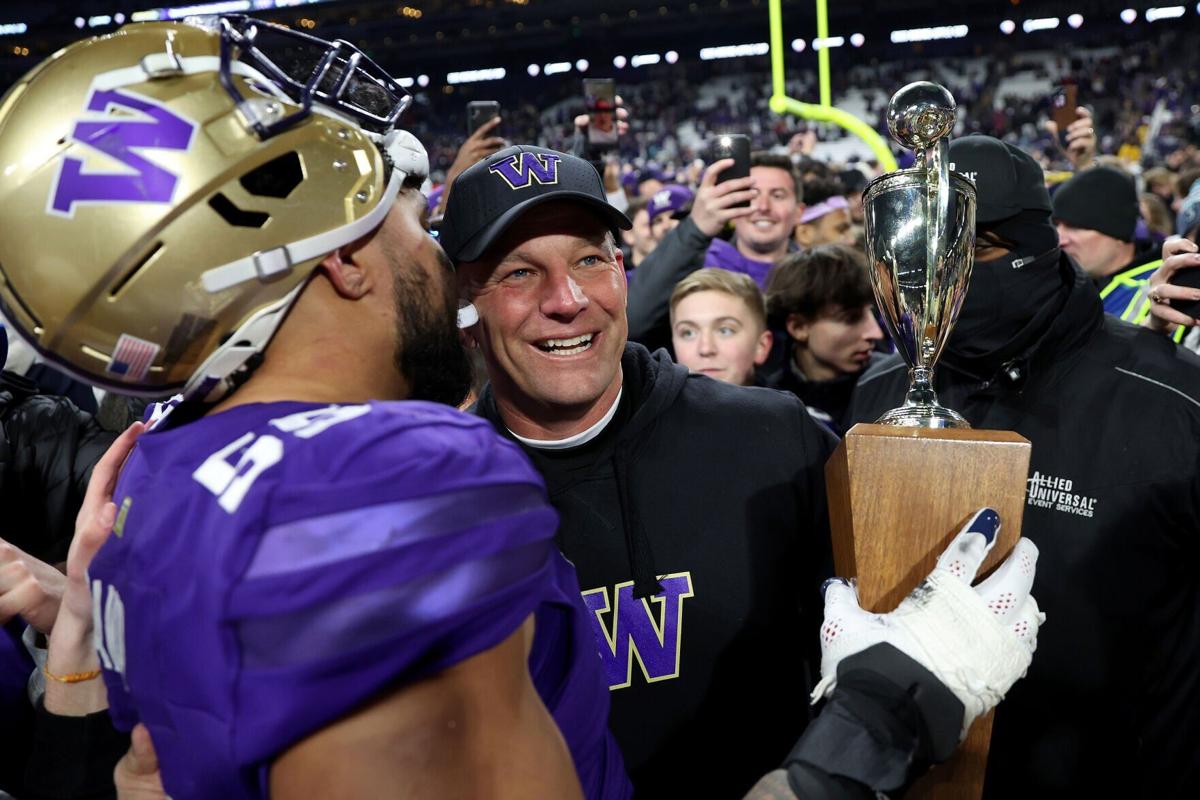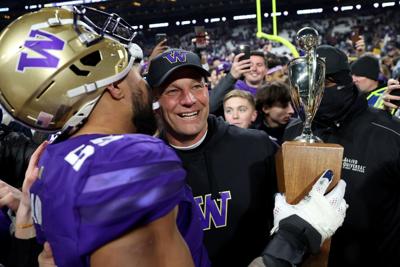SEATTLE — To Washington's next head football coach:
You've got work to do.
Which, if you've scanned social media, should not come as a surprise. Hours ago, former Husky head coach Kalen DeBoer stuffed two years of goodwill into the overhead bin on a one-way flight to Alabama.
He went 25-3 in two nearly incomparable campaigns — winning 21 straight games, a College Football Playoff semifinal and a Pac-12 title in a dizzying UW ascent. He instilled trust in a team that had been drilled with disappointment, following the resignation of Chris Petersen and suspension-turned-firing of Jimmy Lake. He restored pride in a previously careening program.
Then he left wounds the size of Lake Washington.
So again: Welcome, Coach.
Your first priority upon arrival? The roster.
People are also reading…
Is there one?
After all, the playmakers who helped lift the Huskies to a national championship game — quarterback Michael Penix Jr., wide receivers Rome Odunze, Jalen McMillan and Ja'Lynn Polk, left tackle Troy Fautanu, right tackle Roger Rosengarten, edge Bralen Trice, etc. — are each headed to the NFL draft. Two other existing starters (cornerback Jabbar Muhammad and nickelback Mishael Powell) and two incoming transfers (quarterback Will Rogers and linebacker Ethan Barr) entered the transfer portal immediately upon DeBoer's exit.
Oh, and speaking of: Players are allowed 30 days following a coach's departure to utilize the transfer portal without surrendering a season of eligibility. So a more widespread exodus may be imminent.
Ironically, it was Nick Saban — DeBoer's legendary predecessor at Alabama — who often said a coach is only as good as his players.
Now might be a good time to mention that DeBoer's recruiting classes ranked 29th nationally (via 247Sports) in both 2023 and 2024, rungs below the regional competition at Oregon and USC. (As for Lake's recruiting rankings: It's better not to look.)
So first, you have to fervently, relentlessly recruit your roster.
Then recruit everyone else.
Then — and I'm not sure how you'll do this — you must imbed belief, building upon the jilted relationships and smoldering ashes and shards of broken glass DeBoer left behind. Less than a month ago, DeBoer said on early signing day that "today's a big day, because you've got guys you identify, that you have a lot of excitement for, that are very talented, and they stayed true to their commitment. So we're excited about that."
Commitment, in college football, is largely dependent on dollar bills.
(And again: Congratulations and welcome, Coach.)
Your challenge, in a single offseason, is to pave over that disappointment — to earn buy-in, to install new systems, to foster a winning culture while extinguishing existing fires ...
Then to immediately and consistently beat Big Ten teams without Big Ten money.
That, in the long term, may be a bigger issue. Despite the 21-game win streak, the No. 2 national ranking and the exposure that accompanies a remarkable CFP run, UW's athletic department faces financial realities that touchdowns can't (completely) fix. This summer, UW projected a $7.8 million deficit in the current fiscal year.
There's also the matter of paying off the loan that financed Husky Stadium's renovation in 2012. After the university sold 30-year bonds to pay for the project, UW Athletics must make annual payments back to the school throughout the life of the loan. To provide UW's athletic department needed relief, that debt service has been restructured into interest-only payments in FY23, FY24 and FY25.
However: "Debt service will increase from $9.8 million per year to $17.7 million per year in FY26 due to the resumption of principal payments on ICA loans," a UW budgetary document stated this summer. "Prior to this increase in debt service, efforts are underway campus-wide to develop a solution that offers longer-term stability to Athletics."
Like, say, life in a more lucrative conference.
But apologies: It's not so simple.
In the Big Ten, Washington will receive only a partial share of media rights revenue, worth $30 million in Year 1 — per source — and an additional $1 million each year through the contract's conclusion in June 2030. The school — which will receive a full share of the conference's next media rights deal — has the option to borrow up to $10 million per year against future earnings as well, to cover added travel costs and other expenses.
(It's been estimated that UW will earn roughly half of a full Big Ten share, though hard numbers have not been disclosed.)
When he was introduced on Oct. 10, UW athletic director Troy Dannen — your new boss! — downplayed the significance of UW's delayed windfall.
"I understand we have a little bit of a lag coming with the Big Ten, but I'll tell you this: The alternative would be much, much worse," he said. "The move to the Big Ten gives us hope for stability, vitality. While that full per diem from the Big Ten may be a little ways out, the future is bright.
"We beat USC last year [Tulane's 46-45 Cotton Bowl win] with a whole lot smaller budget, because we've got the work ethic. We've got the people. We care. You do all the intangible things right. The Top 25 poll is not based on the Top 25 budgets. It's based on how much you do right."
Given the challenges, you'll have to do a whole lot right to win big at Washington.
Are you — Ryan Grubb, Lance Leipold, Jedd Fisch, Chris Klieman, Pete Carroll, Chris Petersen, whoever you are — willing to do the work?
Will you inherit an unfinished, disillusioned roster and mold it into something more? Will you develop relationships and win recruiting battles in Washington, California and beyond? Will you overcome financial challenges to compete and beat the Big Ten's best?
And if you win, will you stay?
Perhaps that's a question for a different day.







